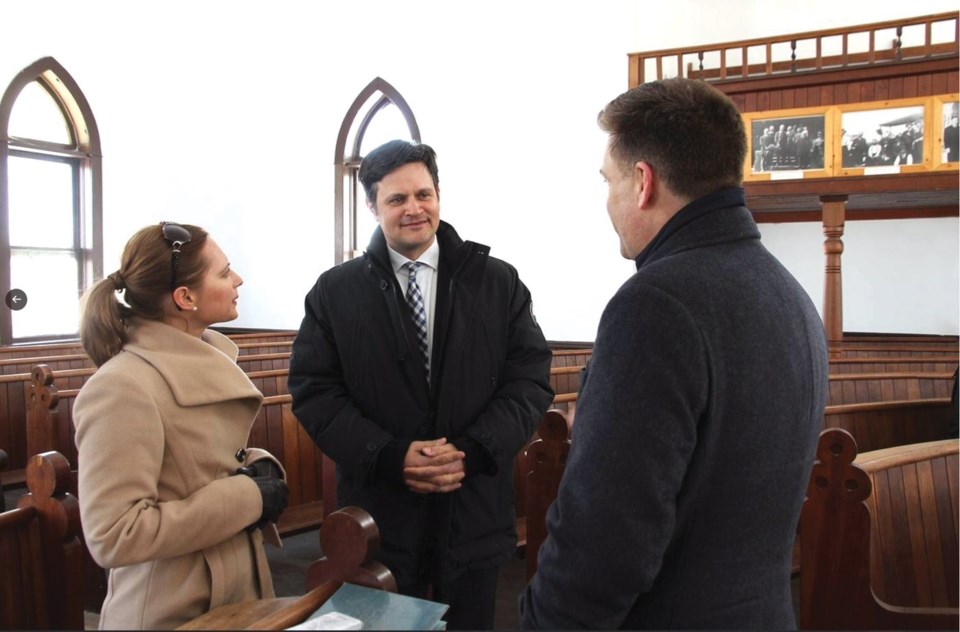Candace Barta-Bonk was recently named Saskatchewan’s Hungarian honorary consul, a role focused on protecting the interests of Hungarian citizens in Saskatchewan and promoting the culture.
Although born in Saskatchewan, Barta-Bonk has deep family ties to Hungary and has always had a connection to the rich Hungarian community in the province and even spent time living in Hungary. This led to her involvement with the consulate.
“I am a fourth-generation Canadian, but I have pure Hungarian roots,” said Barta-Bonk. “All of my great-grandparents were born in Hungary. This has led me to be involved in the Canadian Hungarian community.
“I was approached by the Hungarian Ambassador to Canada and asked if I would be willing to take on this role. It is a great honour for me and of course, I accepted.
“I feel that it is a way to give back and serve two different countries that I have called home. I grew up in Moosomin but moved to Kipling while I was in high school. I have also lived in Hungary Kaposvár for a large portion of my working career. I believe that this will give important context when fulfilling my duties in this role.”
The journey to becoming Saskatchewan’s honorary consul began a few years ago for Barta-Bonk when she hosted Balint Odór on his trip to Saskatchewan.
“In 2017 the Hungarian Ambassador to Canada at the time, Balint Odór, visited Saskatchewan,” she said. “On his trip he visited the Kaposvár Hungarian settlement near Esterhazy and the Bekevár Hungarian settlement near Kipling. I had the privilege of hosting the Ambassador at Bekevár.
“It was very special for me as it was my great-grandparents who were the settlers who helped to build the church. It was after this visit that the ambassador wanted to create an honorary consul position for Saskatchewan. Up until that point, the honorary consul in Calgary was also responsible for Saskatchewan.”
In her role as honorary consul, Barta-Bonk’s priority is working with Hungarians in Saskatchewan and helping to foster the country’s culture in the province.
“The role of honorary consul is to help facilitate cultural, economic, and social relations between Hungary and Saskatchewan,” she said.
“The responsibilities also include assisting Hungarian citizens living in Saskatchewan with notarizations, and authentications of documents as well as directing them to the consul general in Toronto or the Hungarian Embassy in Ottawa. A very important aspect of the role is to promote economic and scientific relations between Hungary and Saskatchewan.
“The Hungarian ambassador to Canada, Dr. Mária Vass Salazar, has a very keen interest in innovation and science, and I am working towards highlighting points of common interest. The honorary consul is also responsible for organizing and preparing a program when the Hungarian Ambassador visits Saskatchewan.”
With a large Hungarian community in Saskatchewan and a strong history in the province, Barta-Bonk is excited to help continue the tradition and share the heritage.
“Hungary and Saskatchewan have a long connection,” she said. “The very first Hungarian settlements in Canada were in Saskatchewan—they were started in the late 1880s at Kaposvár near Esterhazy, Otthon near Yorkton, and Bekevár near Kipling. Many other Hungarian settlements in Saskatchewan followed. There was also a second wave of immigration from Hungary following the 1956 revolution. The Hungarian community is very proud of their shared heritage and traditions. There are very active Hungarian communities in Regina and Saskatoon, with festivals, celebrations, language schools and folk dance groups for all ages.”
Barta-Bonk says it’s a privilege to be able to represent Hungary in Saskatchewan as an honorary consul, and she emphasizes the importance of keeping the cultural connection alive.
“This is something that is very important to me and the main reason why I took this role,” she said. “I feel that it is important for people to know where they come from and to understand their history. The Hungarians who came to Saskatchewan were tough, resourceful people, who integrated into Canadian society but were able to hold on to their culture and traditions, so the Hungarian culture was all around me when I grew up. There was always Hungarian singing, food and of course, the language. I know that this is a similar story for many people in Saskatchewan, and it is my hope that now we have an honorary consul, we can make a stronger connection between Hungary and Saskatchewan.



.png;w=120;h=80;mode=crop)
